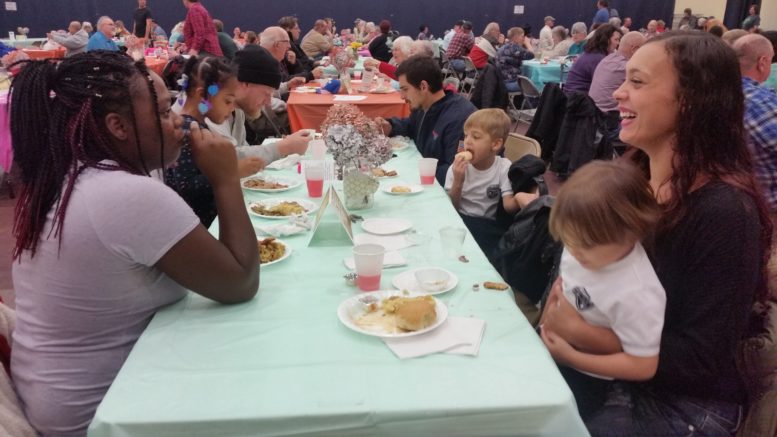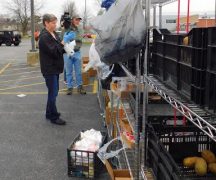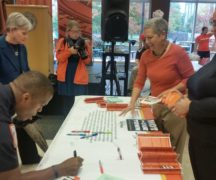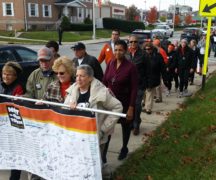By JAN LARSON McLAUGHLIN
BG Independent News
Not In Our Town monthly meetings normally focus on standing up against hatred and discrimination. On Thursday, the members talked about standing up for those who are hungry.
A recent survey showed that college campuses across the nation are seeing a great deal of “food insecurity.”
“We should think of how we’re going to meet that need,” said Christy Lunceford, campus chair of the Not In Our Town Bowling Green organization. “I don’t think the initiatives are meeting the need right now.”
While most of that hunger may be faced by students, faculty and staff members aren’t immune, Lunceford said. “We need to keep that on our radar,” she said.
An open forum on hunger problems is being planned, she added.
“If a student says, ‘I don’t have food for the weekend,’ what do we do,” Lunceford said.
The problem reaches beyond college campuses, said Heather Sayler, a member of Not In Our Town. “Let’s be honest. That happens at our city schools.”
Sometimes the barrier is not distance but attitudinal. Some BGSU students whose driver’s licenses don’t reflect their residency here in Bowling Green, are turned away for not having the right paperwork, said Katie Stygles, of NIOT.
“Sometimes students are treated in negative ways,” Stygles said. “That’s setting up a barrier for students.”
Sayler, who also volunteers with the food pantry at First United Methodist Church in Bowling Green, said she has heard similar concerns voiced by senior citizens about other pantry locations.
Across Wood County, more people are turning to food pantries to help feed their families. Some food banks offer food once a month, others whenever needed. Some require proof of need, others ask for nothing.
Sayler said there are many food programs available. Often the problem is a lack of awareness.
So last year, people representing food pantries throughout Wood County gathered at the United Way office in Bowling Green to collect information on all the grassroots efforts to help the hungry.
Information was recorded on how often food is available, how much food is given per person, and how families qualify at each operation.
The details have been updated in the county’s “211” help telephone system, so when people call for help they are directed to the place most able to assist.
A list of the food pantries in Wood County and the surrounding area can be found at: http://www.referweb.net/211toledo/MatchList.aspx?c;;0;;N;0;0;Family%20Support%20and%20Parenting;Military%20Family%20Support;54;Food%20Pantries~
The website lists 18 sites in Wood County, plus gives details such as who qualifies, the type of documentation needed, the pantry location and hours, and how often someone can pick up food.
In addition to bags of groceries, many of the sites offer such help as free meals, laundry and shower services, clothing, kitchenware, toiletries and baby items. Others provide car care, used furniture or community garden crops.
Many of the operations are hosted by churches. Some are open multiple days a week, others once a month.
In 2015, BGSU President Mary Ellen Mazey signed the President’s Commitment to Food and Nutrition Security and charged the Center for Community and Civic Engagement to act as the convener for campus and community activities designed to address hunger and food insecurity issues in the region.
Mazey supported the Presidents United to Solve Hunger movement, which acknowledges hunger, malnutrition and food insecurity to be a critical threat to a sustainable world. A lack of access to sufficient, nutritious food destabilizes countries, endangers national security, compromises individual and economic productivity, and robs the youngest generation of opportunities for a healthy, prosperous future.
Also at the Not In Our Town meeting, members talked about the possible ramifications of Mazey leaving as president of BGSU.
“President Mazey was ground zero as far as Not In Our Town forming,” Rev. Gary Saunders said.
Lunceford said BGSU’s interim president is also supportive of efforts like NIOT.
“He is also a champion for diversity inclusion,” she said. “I have no cause for concern.”
Not In Our Town members also discussed the upcoming fifth anniversary of the organization on April 7, 2018. The group’s next meeting is Feb. 1, at 3 p.m., in the city council chamber, 304 N. Church St., Bowling Green.





